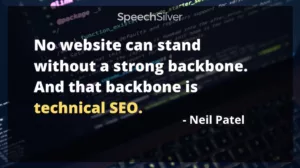A Deep Dive into Technical SEO
In the vast ocean of search engine optimization (SEO), there lies a deep layer often referred to as technical SEO. It’s not about crafting content, it’s not about building links, and it’s certainly not about keyword stuffing. Technical SEO is about ensuring that a website’s infrastructure is optimized for search engine crawling and indexing. In this article, we’ll dive deep into the world of technical SEO, understanding its importance and examining its key components.

What is Technical SEO?
Technical SEO refers to optimizing the infrastructure of a website so that search engines can crawl, interpret, and index its pages efficiently. It encompasses a wide range of actions and best practices that ensure your website adheres to the technical standards and requirements of modern search engines.
Why is Technical SEO Important?
Think of your website as a library. If the library is organized, labeled, and well-maintained, it will be easier for visitors to find and access the books they’re looking for. Similarly, if a website is technically optimized, it’s easier for search engines to crawl, understand, and rank its pages.
Technical SEO ensures that:
1. Search engines can access and crawl your website: If crawlers can’t access your site, they won’t index it, and it won’t appear in search results.
2. Content is understood: Proper coding and tagging ensure search engines understand the context and relevance of your content.
3. Users have a positive experience: Speed, mobile-friendliness, and security all contribute to user experience. A technically optimized site caters to these factors, which indirectly affects rankings.

I just hit this button, right?
Key Components of Technical SEO:
1. Crawlability and Indexing: Ensure that search engines can crawl your site. This includes creating and maintaining an updated XML sitemap, using the robots.txt file correctly, and managing crawl budget (how often and how deep search engines crawl your site).
2. Mobile Optimization: With the rise of mobile searches, it’s vital to ensure that your website is mobile-friendly. Responsive design and mobile performance are crucial.
3. Page Speed: Page loading times impact user experience and SEO rankings. Tools like Google’s PageSpeed Insights can help identify areas of improvement.
4. HTTPS and Security: Secure sites (those starting with HTTPS) have an edge in rankings. Ensure that your site uses a secure protocol and issues like mixed content are addressed.
5. Structured Data: Structured data markup (often in JSON-LD format) helps search engines understand the context of your content, enabling rich snippets and better content categorization.
6. Duplicate Content: Duplicate content can dilute the value of your content in search engines’ eyes. Use canonical tags to indicate the preferred version of a page and prevent content duplication issues.
7. Site Architecture and URL Structure: A logical, flat architecture helps both users and search engines navigate your site easily. Meanwhile, clean and descriptive URLs are more user-friendly and can give search engines context.
8. 404 Errors and Redirects: Broken links can negatively impact user experience and waste crawl budget. Monitor and fix 404 errors, and use redirects wisely.
9. International SEO: If your website caters to multiple languages or regions, implementing hreflang tags ensures search engines serve the right content to the right audience.
10. Core Web Vitals: Google’s initiative for a better web emphasizes three aspects – loading performance, interactivity, and visual stability. These metrics are integrated into ranking factors.
Final Thoughts:

Technical SEO might seem daunting, especially with its constant evolution. However, it’s an integral part of a holistic SEO strategy. As search engines evolve, the technical aspects of a website become increasingly crucial for ranking and visibility. It’s not just about building a site for your audience but ensuring that the site communicates effectively with search engines. By mastering the components of technical SEO, you’re setting the foundation for your website’s long-term success in the search realm.
If you have questions about Technical SEO, and how your site stacks up, email support@strottner.com for a free report. Technical SEO is a component of all of our Concierge SEO packages.





